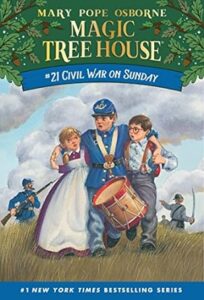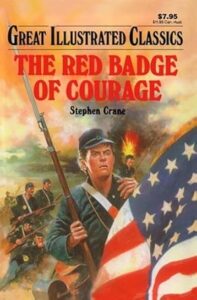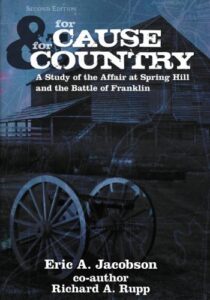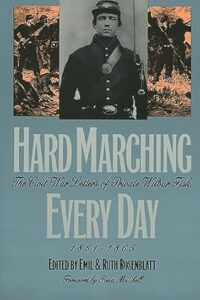Our Favorite Books: Ryan Quint’s Top 5 Books
I read my first book about the Civil War when I was 9 years old (more on that below). From the beginning, I was hooked, and sought out everything I could read about the topic. Now, over 20 years later, I’ve been extremely fortunate to turn that interest into a career in public history, interacting with thousands of people from all over the world every year. New scholarship is always emerging, challenging us to reconsider previously considered ideas, or presenting new angles to old stories. Yet, in the face of the seemingly endless Civil War titles released every year, the five below are ones that remain at the forefront of how I think of, perceive, and interpret the war.
These five titles are not ranked in any kind of order, besides being ones that had, at one time or another, a large impact on me.
Civil War on Sunday, by Mary Pope Osborne
 This is it, the start of a lifetime journey—the first book I ever read about the Civil War. It’s a part of a history series for children—the basic premise involves a brother and a sister being whisked back in time via their Magic Tree House. They end up in various historic eras, and have to make it back to their own time. I read it in the 3rd grade, and was immediately hooked by the time period, and I especially remember being emotionally connected with the character of Johnny, the drummer boy so close in age to my own. For those with kids (or grandkids) and trying to find ways to get them interested in history, I still suggest this book with fondness.
This is it, the start of a lifetime journey—the first book I ever read about the Civil War. It’s a part of a history series for children—the basic premise involves a brother and a sister being whisked back in time via their Magic Tree House. They end up in various historic eras, and have to make it back to their own time. I read it in the 3rd grade, and was immediately hooked by the time period, and I especially remember being emotionally connected with the character of Johnny, the drummer boy so close in age to my own. For those with kids (or grandkids) and trying to find ways to get them interested in history, I still suggest this book with fondness.
Red Badge of Courage, by Stephen Crane
Another book I came to in my early studies, I must have read Crane’s classic war novel a dozen times (I thumbed through the Great Illustrated Classics’ version of the book from the local library enough times my mom bought me my own copy for my birthday). Crane’s book is still a wonderful read, no matter how many times I’ve gone through it.
Freedom National: The Destruction of Slavery in the United States, 1861-1865,
by James Oakes
I first read Oakes’s book in college, and it is one of the few titles that, from the ground up, fundamentally changed how I thought about the Civil War. For so long, Lincoln’s passage of the Emancipation Proclamation has been presented as a last-ditch effort to save the war effort. And yet, as Oakes points out, it was in fact just another in a long line of abolitionist policies passed by the 16th president: the Confiscation Acts; the abolition of slavery in Washington, D.C.; the nullification of the Fugitive Slave Act, etc., etc. I’ve re-read Freedom National two or three times now and come away with new bits of information each time.
For Cause and For Country: A Study of the Affair At Spring Hill and the Battle of Franklin,
by Eric Jacobson and Richard A. Rupp
For my money, this book is not just the best available on the battle of Franklin, it’s the finest battle monograph I’ve ever read (though Scott Hartwig’s recently published I Dread the Thought of the Place is a very close second). It’s wonderfully written, richly-detailed, and impeccably researched. There’s so many myths and misunderstandings that Jacobson and Rupp clarify, and in the process make an intricately detailed web of events easy to understand and comprehend. Its human interest stories and big picture narrative make for a read that I didn’t want to put down until it was finished.
Hard Marching Every Day: The Civil War Letters of Private Wilbur Fisk, 1861-1865,
edited by Emil and Ruth Rosenblatt
Wilbur Fisk, a soldier in the famed Vermont Brigade, wrote dozens of letters back home during the war. He was opiniated, giving wonderful insight into the soldiers’ thinking within the Army of the Potomac. His descriptions of battles, campaigns, and camp life are indefinitely quotable. I find myself, when getting ready to start researching a program for the public, or a writing project, to continuously returning to Fisk’s writings.





The books I read as a kid were the series of children’s novels by James Altscheler, which included titles such as “The Star of Gettysburg” and followed the War from the perspective of two young friends, one a Union the other a Confederate soldier. Does anybody else remember these books?